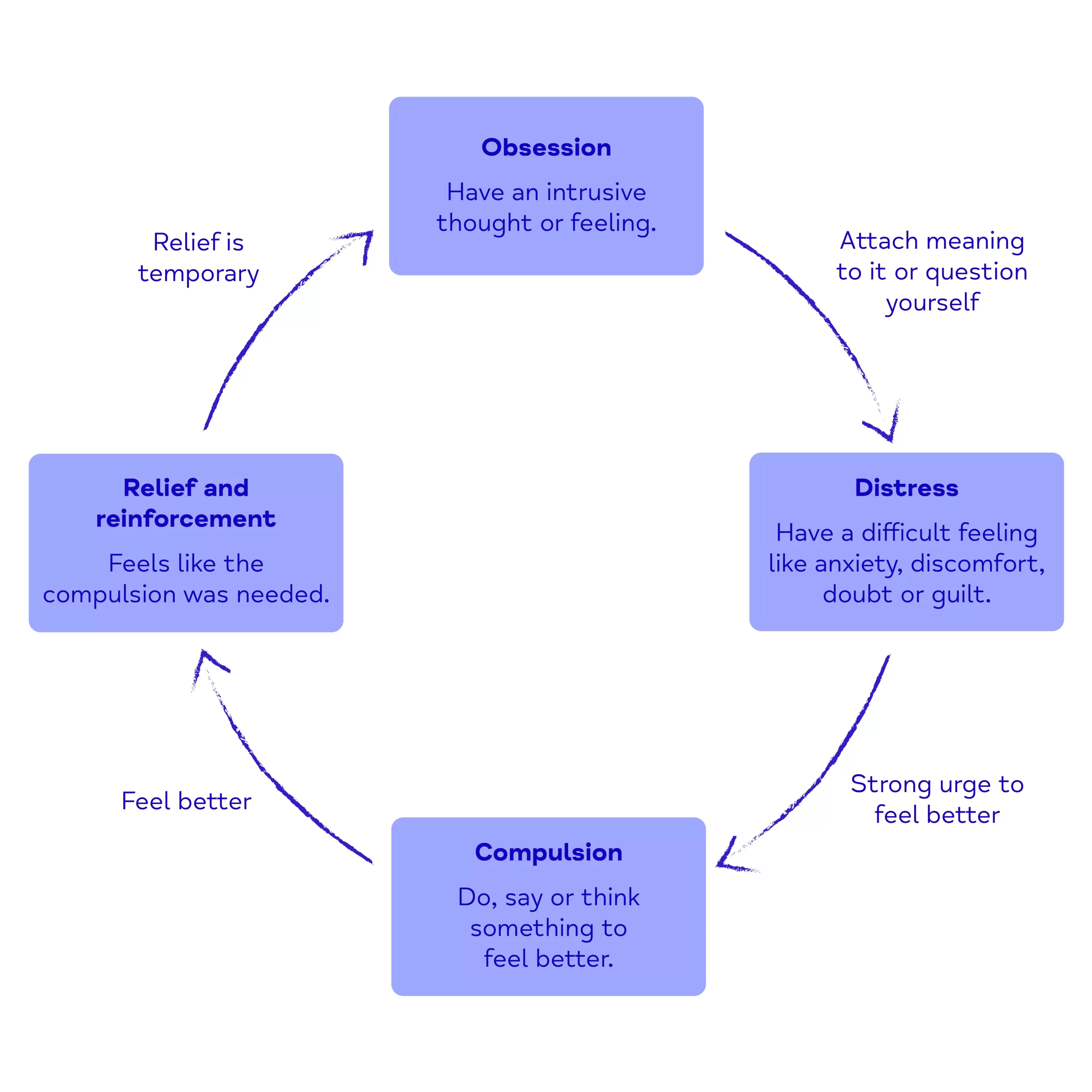Obsessive Compulsive Disorder (OCD)
An introduction to OCD
What is OCD?
Obsessive-compulsive disorder (OCD) is a mental health problem that’s a neurodivergence. It has two main parts that are connected, which you can probably tell from the name – obsessions and compulsions.
Obsessions are recurring doubts, unwelcome feelings, thoughts or worries that keep coming into your mind. It might feel like they’re stuck in your mind, no matter what you do. You may worry about why they won’t go away or what they mean and you may well feel very distressed by them.
Compulsions are repetitive things that you do to reduce the distress or uncertainty caused by obsessions. Compulsions can be things you do in your head (like repeating a specific word), or things you do physically, like repeatedly checking a door is locked.
The OCD cycle

Everyone’s experience of OCD is different, but the image above shows how the cycle of OCD can feel. Because everyone’s experiences are different, there may be parts of this diagram that you find helpful and some parts that you don’t find helpful.
What causes OCD?
The short answer is that there’s no absolutely concrete explanation of what causes OCD. The latest research indicates the causes can be a combination of personal experiences and biology (eg the balance of chemicals in the brain, genetics or something physical in our bodies or brain.
Why is self care important if I have OCD?
If you don’t look after yourself, OCD symptoms can spiral downwards, causing panic attacks and acute anxiety. Everyone should prioritise self care and looking after themselves, not just neurodivergent people.
Here are some ways you can practice self care specifically related to OCD:
Accept intrusive thoughts
Some good news is that intrusive thoughts are very common. One study done in 2020 estimated that we have over 6000 thoughts a day.
It’s understandable to want to get rid of distressing and worrying thoughts. But have you noticed when you try to NOT do something, it’s all you can think of? It’s like when someone says to you, “don’t think of a blue elephant” and blue elephants are suddenly all you can think of.
A more relaxed and helpful approach you can practice is to sit with the thoughts that come into your head, rather than trying to get rid of them or make them better.
Managing compulsions
Compulsions are things we do or say to make ourselves feel better. These can become out of control or excessive with OCD and if they’ve been practiced for a long time they can be difficult to identify.
It can be a fine line identifying whether an action has become a compulsion, but if any of these apply, there’s a good chance an action may have become compulsive:
- It feels urgent
- You feel a need to do it, even if it’s not logical
- You feel anxious if you aren’t able to do it
- You’re not clearly able to explain to yourself or others why you’re doing it
- You feel anxious while doing it
- You don’t feel that you have a choice in whether you do the action or not
Now you’ve identified some compulsions you may be experiencing, you can find ways in which you can manage them. This might feel frightening, but you can start to take back some control by managing the compulsions rather than them managing you.
The charity Mind recommends some ways to manage your compulsions:
- When the urge to act on a compulsion comes, resist it by taking a breath
- Remind yourself in the moment that giving into compulsions WILL make them stronger
- Distract yourself. Go for a walk, phone someone for a chat or do a crossword puzzle
- Practise exposing yourself to things you fear. Sit with the difficult feelings without succumbing to compulsions. This might be a terrifying idea and it could help to schedule in time for this one
- Start small – tackle the compulsion that’s the least intense or least distressing and work your way upwards
Ask for help
Medication and talking therapy are two common treatment methods for OCD. You can use these individually or together.
Two therapies are considered to be effective for OCD – Cognitive Behavioural Therapy (CBT) and Exposure and Response Prevention (ERP).
CBT is a practical therapy that focuses on how your thoughts, beliefs and attitudes affect your behaviours. ERP is designed to treat OCD. It encourages you to confront and accept your obsessions, and resist the urge to carry out compulsions.
Ready to Make a Change?
Book your free discovery call now to find out how coaching can transform your life
Testimonials
What Motherlanders Are Saying
“My reiki session with Sarah was so relaxing and I had some colour reactions which were fascinating. I came away from the treatment feeling calm but also energised. Sarah was relaxed yet professional and I wouldn’t hesitate using her again for future reiki treatments.“
“Sarah’s a brilliant coach, so helpful & enthusiastic. Really builds you up and gives you the courage to live the life you want. I’m a very busy working single mum, and she’s brilliant at coming up with tips to work around my life, helping me to make better choices. Sarah has helped me to understand that you can’t care for others without caring for yourself. She’s so warm and friendly, you can’t fail to feel supported and that she’s got your back.”
“Sarah was so brilliant to work with! She gave me sensible guidance around improving both my physical and mental health that fitted with my life rather than trying a one size fits all approach. She has a calm and practical attitude mixed with natural empathy. Sarah is a breath of fresh air and she provides a non-judgemental space for you to self develop (but with her fab expertise on hand!) I thoroughly recommend working with Sarah.”
Ready to Make a Change?
Book your free discovery call now to find out how coaching can transform your life
